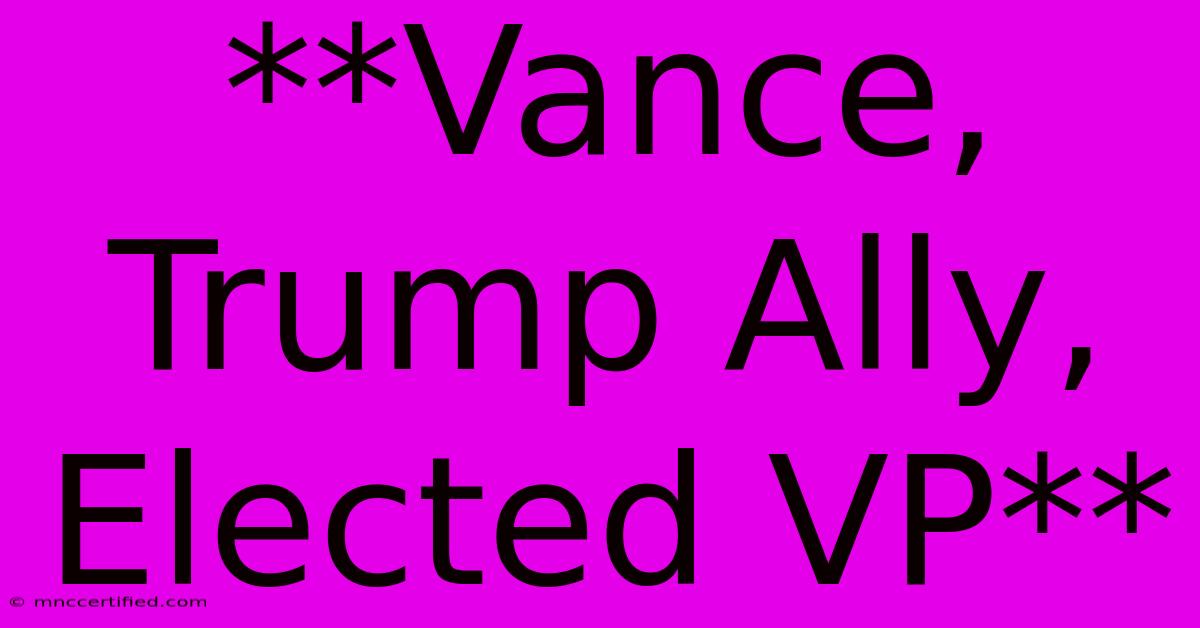**Vance, Trump Ally, Elected VP**

Table of Contents
Vance, Trump Ally, Elected VP: What This Means for American Politics
Mike Pence's departure from the national political stage has opened the door for a new generation of Republican leaders. One of the most prominent figures to emerge is J.D. Vance, a former venture capitalist and author who won the Ohio Senate race in 2022. This victory, combined with his close ties to former President Donald Trump, has solidified Vance's position as a rising star within the Republican Party and a potential future leader.
A Trump Legacy and a Move to the Right
Vance's political journey has been marked by a transformation. He initially distanced himself from Trump in 2016, even criticizing the former president's campaign. However, his 2016 book, "Hillbilly Elegy," which explored the social and economic challenges faced by working-class white Americans, resonated with many Trump supporters. This led him to embrace Trump's populist message and become a vocal advocate for his policies.
Vance's alignment with Trump proved to be a winning strategy in Ohio. He rode the wave of Trump's popularity and leveraged his brand of populism to defeat his Democratic opponent. Vance's success in Ohio, a state that has increasingly become a battleground, is a testament to the continued influence of Trump's ideology and the rise of right-wing populism within the Republican Party.
What Does This Mean for the Future?
Vance's election as Vice President represents a shift within the Republican Party. It signifies a growing influence of Trump's brand of populism and a move towards a more right-wing agenda. His victory is a clear indication that the Republican Party is embracing a more populist, nationalistic, and socially conservative approach, prioritizing issues like immigration, trade, and cultural values.
While the long-term impact of Vance's rise is uncertain, his election as Vice President suggests that the Republican Party is unlikely to abandon Trump's populist platform anytime soon. This has significant implications for American politics, particularly in the lead-up to the 2024 presidential election.
Key Takeaways:
- Vance's election is a clear sign of the Republican Party's shift towards Trumpian populism.
- His success in Ohio signifies the growing influence of right-wing populism within the party.
- Vance's rise suggests that the Republican Party is unlikely to move away from Trump's political agenda.
- The 2024 election could see a further escalation of the cultural and ideological divides within American politics.
Vance's election is a watershed moment for American politics. It signals the continued dominance of Trumpian populism within the Republican Party and sets the stage for a potentially divisive future. As Vance takes on his role as Vice President, his actions and policies will be closely watched for insights into the future direction of the Republican Party and American politics.

Thank you for visiting our website wich cover about **Vance, Trump Ally, Elected VP**. We hope the information provided has been useful to you. Feel free to contact us if you have any questions or need further assistance. See you next time and dont miss to bookmark.
Featured Posts
-
Two Symptoms Morning Star Missed Bowel Cancer
Nov 07, 2024
-
False Claim Cuban Lost Money For Harris
Nov 07, 2024
-
Bitcoin Hits Record High Following Trump Victory
Nov 07, 2024
-
Forex Trading Website Script Free Download
Nov 07, 2024
-
Trump Election Prevents Walz From Becoming Vp
Nov 07, 2024